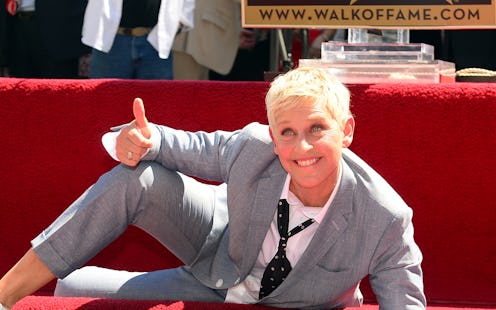Entertainment
Ellen Explains Why We Need A Woman On The $20 Bill
"Women On 20s" is an organization campaigning to put a woman on the $20 bill in the next five years. During a recent show, Ellen DeGeneres perfectly explained why putting women on paper money is worthwhile and long overdue. Only two women have been the faces of pieces of U.S. currency: Susan B. Anthony and Sacagawea. However, their portraits both adorned $1 coins, which have a history of low circulation (the only other woman on a U.S. coin is Helen Keller, who is featured on the Alabama quarter). Ellen sums things up nicely by saying, “I think I can speak for all women when I say, we can do more than feed meters.”
Ellen points out that having a woman on the $20 bill would send a powerful message to women about the possibilities open to them, remarking, “First of all, it’s important for young women to have a constant reminder that there are amazing female role models and that they can do anything. Anything at all.” Women On 20s wants to get a woman on the $20 bill by 2020, the year that happens to be the 100th anniversary of the 19th amendment, which guaranteed women the right to vote. Ellen explains that having a woman on paper major currency would highlight the strides that women have made in the United States in the last century:
And it would show tremendous progress for women. I mean, a hundred years ago, we couldn’t vote. We have come such a long way. I mean, here I am, a woman, wearing pants on national television, drunk as a skunk, gay is the day is long.
OK, let’s just take a moment to celebrate this delightful human.
Women On 20s is currently allowing people to vote for which American woman they want to adorn the $20. You can choose between four candidates, who were chosen after a primary round of voting that garnered more that 256 thousand votes. Here are your options:
Eleanor Roosevelt (1884 - 1962)
As Women on 20s describes, Eleanor Roosevelt “redefined the role of First Lady.” An outspoken political force in her own right, Roosevelt advocated for women’s rights and the civil rights of African and Asian Americans. She was the first chair of the UN Commission on Human Rights, and was described by President Harry Truman as “The First Lady of the World.”
Harriet Tubman (c. 1822 – 1913)
After escaping from slavery in 1949, Tubman became a leader for the Underground Railroad, making 19 trips back to the South to help more than 300 slaves gain freedom. During the Civil War, she served the Union as a cook, nurse, and spy.
Rosa Parks (1913 – 2005)
On December 1, 1955, Rosa Parks famously refused to give up her seat on the bus to a white passenger. Her arrest lead to the Montgomery Bus Boycott, and she became a major symbol of the Civil Rights Movement. A civil rights activist throughout her life, Parks was the recipient of the Presidential Medal of Freedom and the Congressional Gold Medal, the highest civilian awards in the U.S.
Wilma Mankiller (1945 – 2010)
Women on 20s explains that Cherokee Nation Chief Wilma Mankiller was added to the ballot due to “strong public sentiment that people should have the choice of a Native American to replace Andrew Jackson.” (Jackson was a staunch supporter of the Indian Removal Act of 1830, which gave the president the power to force Native American tribes off their territory. By the end of his term in 1837, his administration had removed 46,000 Native Americans from their lands.) Mankiller served as Chief of the Cherokee Nation from 1985 to 1995; she was the first woman to be elected as Chief of a Native American nation. According to Women on 20s, during her tenure as Chief, Mankiller “revitalized the Nation through extensive community development, self-help, education and healthcare programs for the Cherokee Nation’s 300,000 citizens.” She was awared the Presidentical Medal of Freedom in 1998.
Vote for your favorite candidate here!
Images: YouTube; Wikimedia(3); Getty Images
